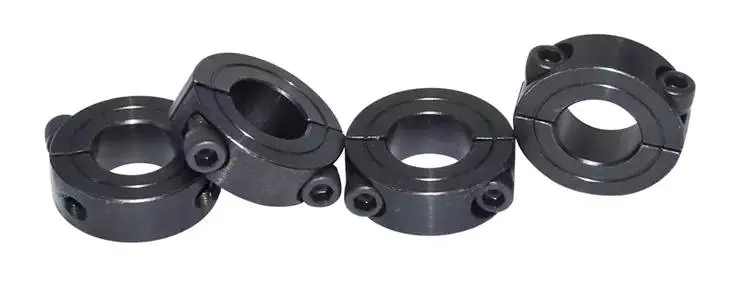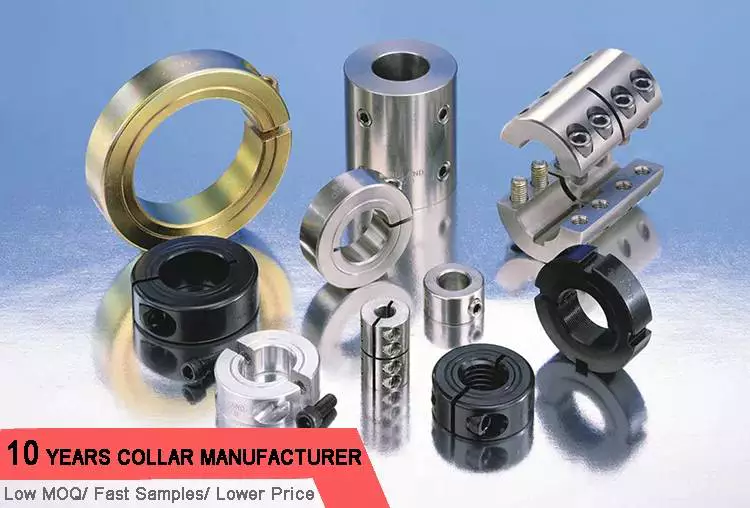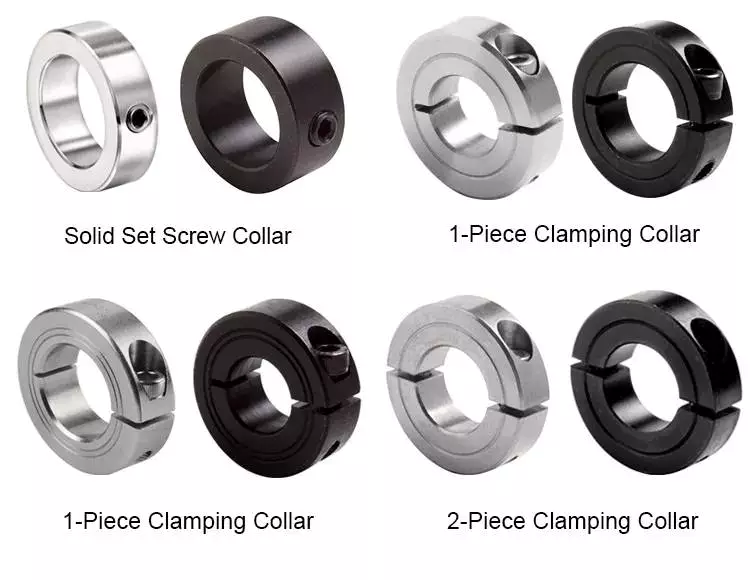Product Description
Product Description
Simply slide these shaft collars CZPT a shaft and tighten the screw to hold the shaft collar in place. Shaft collars are easy to adjust with their screws.
| Size | 1/8″ to 6″ and 3mm to 150mm. or non-standard according to your requirements. |
| Material | Mild Steel C20 C45 ,Stainless Steel SS304 316 , Aluminum |
| Process | CNC Turning, Forging |
| Size | 1/8”-1” OR Custom Sizes |
| Surface Treatment | Zinc Plated, Anodized, Black Oxide, etc. |
| Type | solid shaft collar |
| single split shaft collar | |
| doubel split shaft collar | |
| eccentric collar | |
| threaded shaft collar ( single split ) | |
| dimensions of S type split collar |
Detailed Photos
Catalogue
1) METRIC CZPT SHAFT COLLAR
2) INCH CZPT SHAFT COLLAR
3) METRIC SET SPLIT COLLARS
4) INCH SET SPLIT COLLARS
Packaging & Shipping
carton boxes+ export wooden box
FAQ
Q1: Are you trading company or manufacturer ?
A: We are factory.
Q2: How long is your delivery time and shipment?
1.Sample Lead-times: 10-20 days.
2.Production Lead-times: 30-45 days after order confirmed.
Q3: What is your advantages?
1. The most competitive price and good quality.
2. Perfect technical engineers give you the best support.
3. OEM is available.
/* January 22, 2571 19:08:37 */!function(){function s(e,r){var a,o={};try{e&&e.split(“,”).forEach(function(e,t){e&&(a=e.match(/(.*?):(.*)$/))&&1
| Standard Or Nonstandard: | Standard |
|---|---|
| Bore Diameter: | 4-50mm |
| Structure: | Flexible |
| Material: | Carbon Steel C20 C45 |
| Type: | Shaft Collar |
| Surface Treatment: | Zinc Plated or Black Oxide as Required |
| Customization: |
Available
| Customized Request |
|---|

What are the temperature and corrosion resistance properties of shaft collars?
The temperature and corrosion resistance properties of shaft collars vary depending on the materials they are made of. Different materials exhibit different levels of resistance to temperature extremes and corrosion. Here are some commonly used materials for shaft collars and their temperature and corrosion resistance properties:
- Steel: Steel shaft collars, particularly those made from stainless steel, offer excellent temperature and corrosion resistance properties. Stainless steel is known for its high strength, durability, and resistance to rust and corrosion. It can withstand a wide range of temperatures, from low cryogenic temperatures to high heat environments. Stainless steel shaft collars are often used in applications where exposure to moisture, chemicals, or harsh environments is a concern.
- Aluminum: Aluminum shaft collars have good temperature resistance properties and can handle moderate temperature ranges. They are lightweight and offer reasonable corrosion resistance. However, aluminum is not as corrosion-resistant as stainless steel and may be susceptible to certain chemicals or highly corrosive environments. Aluminum shaft collars are commonly used in applications where weight reduction is a priority, such as aerospace or automotive industries.
- Plastic: Plastic shaft collars, such as those made from nylon or acetal, have limited temperature resistance compared to steel or aluminum. They can typically handle moderate temperatures but may deform or degrade at higher temperatures. Plastic collars are not as resistant to corrosion as metal collars but can still offer good resistance to certain chemicals and environmental conditions. Plastic collars are often used in applications where weight, cost, or electrical insulation properties are important factors.
- Brass: Brass shaft collars offer good temperature resistance and moderate corrosion resistance. They can handle a range of temperatures and are often used in applications where a combination of durability, conductivity, and aesthetics is required. Brass collars may tarnish over time but can still maintain their functionality and structural integrity.
It is important to note that the temperature and corrosion resistance properties of shaft collars can also be influenced by factors such as the specific alloy composition, surface treatments, and environmental conditions they are exposed to. When selecting shaft collars for your application, it is crucial to consider the temperature range and potential exposure to corrosive substances or environments. Consulting with manufacturers, reviewing technical specifications, and considering industry standards or guidelines can help ensure that you choose shaft collars with appropriate temperature and corrosion resistance properties for your specific needs.

Where can I purchase shaft collars with set screw or clamp-style designs?
If you are looking to purchase shaft collars with set screw or clamp-style designs, there are several options available to you. These types of shaft collars can be found in various industrial supply stores, online marketplaces, and directly from manufacturers. Here are some places where you can purchase shaft collars with set screw or clamp-style designs:
- Industrial Supply Stores: Local industrial supply stores or distributors that specialize in mechanical components and equipment often carry a range of shaft collars. These stores may have a physical location where you can visit and browse their inventory. They typically have knowledgeable staff who can assist you in selecting the right collar design and size for your specific application.
- Online Marketplaces: Online marketplaces, such as Amazon, eBay, or Alibaba, offer a wide selection of shaft collars with set screw or clamp-style designs. These platforms allow you to search for specific collar types, sizes, and materials, and compare prices and customer reviews. When purchasing from online marketplaces, it is important to verify the credibility and reputation of the sellers to ensure product quality and reliability.
- Manufacturer Websites: Many manufacturers of shaft collars have their own websites where you can directly purchase their products. Visiting the websites of reputable collar manufacturers allows you to explore their product catalogs, specifications, and available collar designs. This can be particularly useful if you are looking for specific features, customization options, or require technical assistance from the manufacturer.
- Online Industrial Suppliers: Online industrial suppliers or distributors specialize in providing a wide range of mechanical components and equipment. These suppliers often have extensive catalogs of shaft collars with various designs, including set screw and clamp-style options. They typically offer convenient online ordering and delivery options, making it easy to browse and purchase the collars you need.
- Trade Shows and Exhibitions: Attending trade shows or exhibitions related to industrial components and equipment can provide an opportunity to connect with multiple suppliers and manufacturers in one place. These events often feature exhibits where you can interact directly with vendors, explore their product offerings, and discuss your specific requirements. Trade shows can be a valuable resource for finding and purchasing shaft collars with set screw or clamp-style designs.
When purchasing shaft collars, it is important to consider factors such as collar material, size range, load capacity, and any specific requirements of your application. Comparing prices, reading customer reviews, and ensuring the reliability of the seller or manufacturer can help you make an informed decision and obtain high-quality shaft collars that meet your needs.

What is a shaft collar and its role in mechanical systems?
A shaft collar is a mechanical component used in various applications to provide support, positioning, and locking functions for rotating shafts. It is a cylindrical device that fits around a shaft and is typically secured in place using set screws or clamping mechanisms. The collar is designed to prevent axial movement of the shaft and maintain its position within a mechanical system. Here is a detailed explanation of the role and significance of shaft collars in mechanical systems:
Support and Positioning:
One of the primary roles of a shaft collar is to provide support and positioning for a shaft within a mechanical system. It acts as a physical barrier that prevents the shaft from moving along its axial direction. By securing the collar at a specific location along the shaft, it helps maintain the desired position of the shaft relative to other components, such as bearings, gears, or pulleys. This support and positioning function ensures proper alignment and operation of the system, preventing unwanted vibrations, misalignment, or excessive wear.
Axial Load Distribution:
Shaft collars also help distribute axial loads along the length of the shaft. When a mechanical system experiences axial forces or thrust, the collar can help transmit and distribute these forces to the supporting components, such as bearings or thrust washers. By evenly distributing the load, shaft collars help prevent localized stress concentrations and improve the overall load-bearing capacity of the system.
Limiting Radial Movement:
In addition to preventing axial movement, shaft collars can also limit radial movement of the shaft within a given range. The collar’s design and tight fit around the shaft create a mechanical barrier that restricts radial play or shifting of the shaft. This is particularly important in applications where precise positioning or clearance control is required, such as in linear motion systems, conveyor systems, or machinery with rotating components.
Securing Components:
Shaft collars often serve as a means of securing other components onto the shaft. They can act as a stopping point or reference surface against which other elements, such as bearings, sprockets, gears, or pulleys, can be mounted. By securing these components with set screws or clamping mechanisms, shaft collars ensure their proper alignment and prevent unintentional movement or disengagement during operation.
Adjustability and Easy Installation:
Another advantage of shaft collars is their adjustability and ease of installation. They can be easily positioned and moved along the shaft without requiring complex tools or specialized equipment. This adjustability allows for fine-tuning of the shaft’s position and alignment within the system. Additionally, the simplicity of their design and installation makes shaft collars a cost-effective solution for various mechanical applications.
Overall, shaft collars play a significant role in mechanical systems by providing support, positioning, load distribution, and component securing functions. Their presence helps ensure the stability, alignment, and efficient operation of rotating shafts in diverse applications across industries such as manufacturing, automation, robotics, and machinery.


editor by CX 2024-03-26